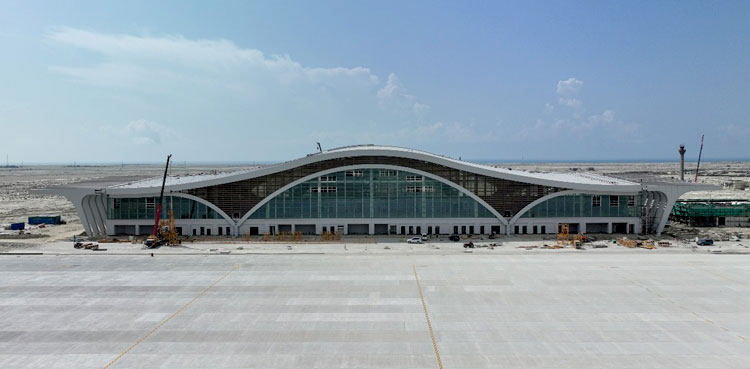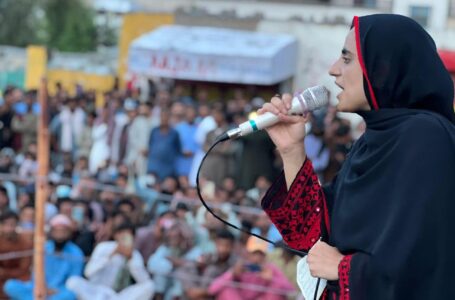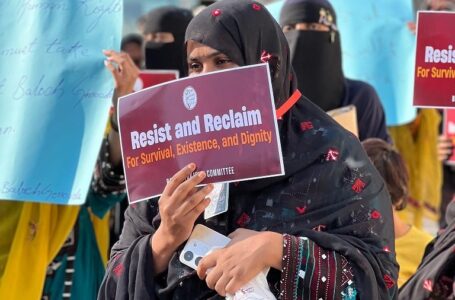FBM Holds Simultaneous Protests Against Pakistan’s Nuclear Tests on Baloch Land
A Strategic Blow to Pakistan

The Baloch Liberation Army (BLA) has successfully disrupted the long-anticipated inauguration of the Gwadar International Airport, a key infrastructure project tied to the China-Pakistan Economic Corridor (CPEC).
This development reflects the persistent security challenges faced by Pakistan in Balochistan which the pro-freedom Baloch political party and Baloch armed organisations say is under illegal occupation of Pakistan. It signals a significant setback to Pakistan’s ambitions of economic and geopolitical stability in the region. The attack, which forced Pakistani authorities to cancel the event, has sent a strong message to international investors about the risks of operating in an area fraught with an ongoing liberation movement and Pakistani army’s brutal atrocities against Baloch people.
Coordinated Attacks in Jiwani
On December 29, the BLA carried out two strategic attacks in Jiwani, a coastal city in Gwadar Balochistan, targeting the Pakistani Coast Guard. Azad Baloch, a spokesperson for the BLA, claimed responsibility for these operations, highlighting the group’s operational sophistication and intent to disrupt state authority in the region.
BLA fighters ambushed Coast Guard personnel in the Ganz area, killing two soldiers on the spot. A third succumbed to injuries while being transported to a hospital. A rescue convoy of four vehicles dispatched from the Coast Guard headquarters in Bandar was ambushed at Panwan Laando Zogar. This bombing resulted in one additional fatality and five injuries among the soldiers.
These attacks were part of a broader strategy to undermine Pakistan’s military presence and infrastructure in the region. The continuous attacks by Baloch freedom fighters forced Pakistan Coast Guards to cancel duties in several areas of Gwadar including Jiwani, Panwan, Pishkan, Ganz, Pasni, and other coastal areas.
Earlier in 2024, the Pakistan army abandoned several check posts and retreated from the Kahan area of district Kohlu in Kohistan Marri region due to Pakistan’s crippling economy and consistent attacks from the freedom fighters of the Baloch Liberation Army.
Strategic Implications
The cancellation of the Gwadar Airport inauguration due to security concerns is a symbolic and strategic victory for the BLA fighters. Gwadar, a flagship project of CPEC, is central to Pakistan’s plans to boost trade and connectivity with China and other global markets. However, the inability to secure such a high-profile event highlights the state’s lack of control over the region.
For international stakeholders, the incident underscores the risks associated with investing in Balochistan. The BLA’s repeated targeting of CPEC projects signals its opposition to foreign involvement in the region, which it perceives as exploitative and detrimental to the local population and the Baloch freedom struggle.
The BLA’s spokesperson, Azad Baloch, has repeatedly urged foreign investors and countries that showed an interest in Balochistan to avoid becoming Pakistan’s crime partner against the Baloch people. The Baloch pro-freedom parties believe that any investment in Balochistan through Pakistan will strengthen Pakistan’s illegal occupation and its atrocities against the Baloch people. Pakistan has already forcibly displaced thousands of Baloch on the CPEC route from their ancestral lands in the name of development. There are also reports that Pakistan will flood Gwadar
The Baloch Liberation Army: Objectives and Ideology
The BLA has positioned itself as a defender of Baloch rights, sovereignty, and resources against what it views as the occupation and exploitation by Pakistan and foreign powers that trap themselves in Pakistan’s canning slogans of development. The group’s objectives can be summarised as follows:
Halting Exploitation of Baloch Resources: Balochistan is rich in natural resources, including minerals and gas. The BLA opposes projects that it claims benefit Pakistan and foreign entities at the expense of the local population.
Opposition to CPEC: The group views the China-Pakistan Economic Corridor as a vehicle for exploitation and demographic engineering in Balochistan. Delays and disruptions to CPEC projects, including Gwadar Airport, are central to the BLA’s strategy.
Resistance Against Occupation: The BLA frames its struggle as a liberation movement against Pakistani occupation. Its attacks target military installations and collaborators to undermine the state’s authority. The ultimate goal of the BLA is the creation of a sovereign Baloch state, free from Pakistan’s illegal occupation.
The BLA employs a variety of tactics to achieve its objectives, including ambushes, sniper attacks, and remote-controlled bombings to target military personnel and infrastructure.
Through coordinated media campaigns, the BLA communicates its objectives and justifies its actions, aiming to garner local and international support. The group has also consistently targeted high-profile projects and events, such as Gwadar Airport, to disrupt state-led development efforts.
History of Notable Operations
The BLA has carried out numerous high-profile attacks over the years:
2015: An attack on Gwadar’s radar installation disrupted critical infrastructure linked to CPEC.
2017: An attack on construction workers along the Gwadar-Pishkan Road resulted in 11 fatalities.
2023: A remote-controlled bomb derailed a military train in Mashkaf, killing 10 soldiers.
2024: On election day, the BLA launched 43 coordinated attacks targeting polling stations and military convoys, causing widespread disruption across Pakistan-occupied Balochistan from Kohlu and Gwadar.
In Kahan, not a single vote was casted during Pakistan’s general elections. The Pakistan election commission was finally compelled to relocate several polling stations to Kohlu as they failed to conduct elections in their original constituencies due strong resistance from BLA fighters.
Gwadar “International” Airport
The Gwadar International Airport is a linchpin in Pakistan’s vision for CPEC. The project has faced repeated delays and security threats, with the recent cancellation of its inauguration highlighting its precarious status. For Pakistan, Gwadar represents a potential economic gateway; for the BLA, it symbolises the exploitation of Balochistan’s resources without local consent.
The BLA’s successful disruption of the inauguration exposes the vulnerabilities in Pakistan’s security apparatus and casts doubt on the viability of its ambitious development plans. For international investors, the incident underscores the importance of understanding and addressing the Baloch-Pakistan historical conflict which started after Pakistan forcibly occupied and illegally annexed Balochistan.
Conclusion
The BLA’s operations in Jiwani and the subsequent cancellation of the Gwadar Airport inauguration mark a significant moment in the ongoing conflict in Balochistan. By disrupting state-led projects and targeting state-backed collaborators, the BLA has demonstrated its ability to challenge Pakistan’s authority and project strength in the region.
This latest development underscores the broader issue: no amount of investment or militarisation can stabilize Balochistan without addressing the legitimate grievances of its people. The BLA’s actions serve as a stark reminder that sustainable development in the region requires an approach rooted in justice, equity, and respect for the aspirations of the Baloch people.










